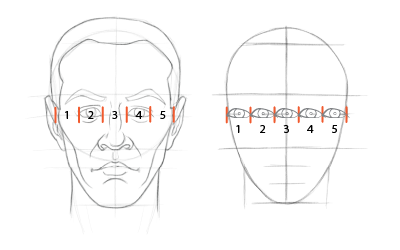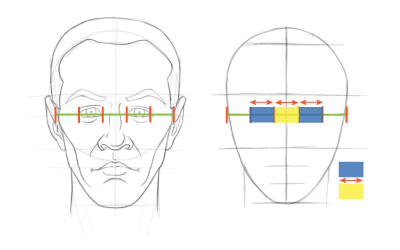One way to improve our ability to draw a face or head is to learn where the features fit relative to each other and their approximate sizes compared to the head.
To do this, we can turn to the figure proportions guides. These figure proportions guides are maps to drawing the human body created by artists who observed some commonalities between the shapes and forms of the body. They developed these guides based on these commonalities to help the rest of us.
We can draw a person more accurately and quickly using these proportional guides.
Today, we will look at some proportional guidelines to place and size the eyes correctly. Learning to position and size the eyes is a great place to start learning the proportions of the head. Using these guidelines not only helps us with the eyes, but it will also help us draw the facial features more accurately.
The Height of the Head: Our first unit of measurement
The first thing we need to find is the height or length of the head. This measurement is an important one. Many proportions guides use the head length as a primary or base measurement. The guides compare the sizes of the body's forms to the length of the head to find the correct size. The proportional guides describe lengths of the body's parts as measured in head lengths.
We measure the length of the head from the top of the head down to the chin. Be careful to measure the top of the head and not the top of the face. We find the top of the head above the hairline, within the body of the hair.
As it pertains to drawing the head, we use the head length to find the position of the eyes along the vertical axis of the head. We divide the head length into smaller measurements to determine how high up on the head to place the eyes.
Positioning the eyes along the vertical axis
To find the location of the eyes along the vertical axis or the height of the head, we divide the head length into two halves. We then draw a line separating those halves. The line we draw to indicate this division between the two halves is where the eyes sit.
The eyes sit in the middle of the head. If we measure the distance between the eye location and the top of the head, then measure the distance between the eye location and the chin, we will find both distances are approximately the same length.
This line dividing the head in half is the eye line. We position the eyes over this line as we draw to establish the eye's position lengthwise. We also use this line to find the size of the eyes.
Sizing the eyes
To find the size of the eyes, the next thing we need to find is the width of the head. We can indicate the head width with a couple of lines on each side of the head, crossing the eye line.
Once we have the width indicated, we divide this measurement into fifths. We then draw a line indicating the boundaries of each segment. Once we finish we have the head divided into five equal parts.
This measurement is the width of an eye.
Each eye is approximately one-fifth the width of the head. Five eyes fit within the head from side to side.
We are almost ready to draw the eye. All we need to find is the location of each eye along the eye line.
Positioning the eyes along the horizontal axis
The head is symmetrical, as the right side is a mirror of the left. Each eye is an equal distance away from the center of the face. We now need to find the distance between the eyes to position them on the eye line correctly.
We have some good news here. We have already found that distance when found the width of the eye. The distance between the eyes is the same length as the width of an eye. The distance between the eyes is approximately one-fifth the width of the head.
When we divided the width of the head into fifths, we found the distance between the eyes and marked the position for the eyes simultaneously.
The center segment is the space between the eyes. This center segment rests squarely in the middle of the width of the head. Half of this segment sits on the right side, and the other half sits on the left. We draw the tear ducts of each eye on the two lines indicating the edges of this segment.
The two segments on each side of the center one are where we draw the eyes.
_____
By using these proportional guidelines, we can accurately draw the eyes. We can draw them in the right location on the head and size them accurately.







